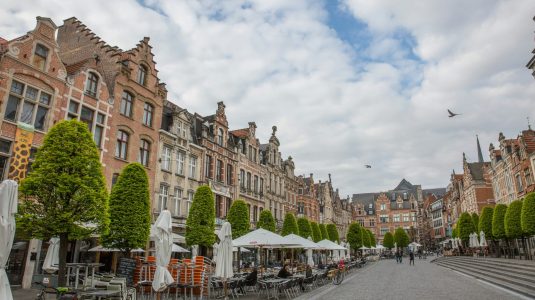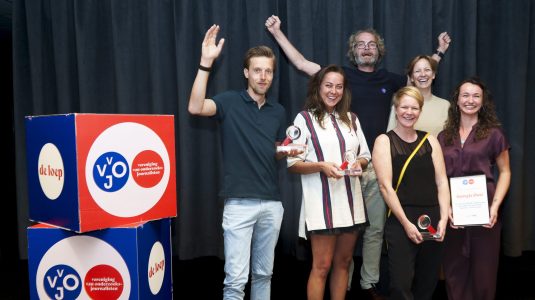 David Barstow won de Pulitzer Prize 2009 voor The New York Times met de onthulling dat de grote Amerikaanse networks gepensioneerde generaals gebruikten als commentatoren op de oorlog in Irak en Afghanistan, terwijl diezelfde generaals tegelijkertijd consultants waren voor de defensie-industrie bij het binnenhalen van contracten in deze oorlogen. Hoe krijg je zo’n gecompliceerd verhaal rond, in je eentje?
David Barstow won de Pulitzer Prize 2009 voor The New York Times met de onthulling dat de grote Amerikaanse networks gepensioneerde generaals gebruikten als commentatoren op de oorlog in Irak en Afghanistan, terwijl diezelfde generaals tegelijkertijd consultants waren voor de defensie-industrie bij het binnenhalen van contracten in deze oorlogen. Hoe krijg je zo’n gecompliceerd verhaal rond, in je eentje?
Tekst: Margo Smit, 22 april 2010
“I like them to completely underestimate me at the beginning, and overestimate me in the end. I create this psychological arc during my investigations. I do that with all my investigations. Specially with powerful individuals who have no reason to talk to you at all. I give off the impression that resistance is futile, that it is more risky not to talk to me than to talk to me.”
Na de aanslagen in de Verenigde Staten in 2001 verscheen een keur aan gepensioneerde generaals op de grote Amerikaanse zenders als CNN, ABC en NBC, om de moeilijk te begrijpen invallen in eerst Afghanistan en daarna Irak aan de kijkers te verklaren. Barstow zag het aan en verbaasde zich.
“I started off with a tip about one gentleman moonlighting for a network as a commentator, and went looking for the amazing access guys like him had to the Pentagon. There were so many of these retired military, often decorated, war heroes, that I gave off the impression that I talked with all of them, and none knew who had said what to me. And so a lot talked with me.”
De grote networks vertelden hun kijkers niets over de banden tussen hun zogenaamd onafhankelijke commentatoren en de defensie-industrie. Een generaal vertelde de ene dag op TV dat het leger behoefte had aan zwaar gepantserde voertuigen van een bepaalde kleine firma, en hield de dag erna voor die fabrikant bij de Senaat datzelfde pleidooi. Onderwijl wisten de kijkers niet dat de man in kwestie voor $10.000 per maand op de loonlijst stond van de bouwer van de gepromote voertuigen. Uiteindelijk wist Barstow aan te tonen dat de networks van de banden tussen generaals en de defensie-industrie op de hoogte waren, maar het voor zich hielden.
“I never thought about getting a partner on this story at one of the TV stations, it just was not feasible. They were part of the story I was reporting on. I used the website instead, I showed an e-mail trail between the Pentagon and these generals, and basically showed the reader on the website how the plumbing worked.
I documented myself by getting a paper trail by starting with sources that had just left the military, asking them for information, documents and e-mails. And then, when I knew a little more what I was dealing with, I used the Freedom of Information Act. We even sued the Pentagon and after two years got 10.000 pages of mails and documents. I would like to say it was like pulling teeth, but that would be insulting teeth. I didn’t want to take them to court, but I had to. I argued that I worked for a large audience on a breaking news story, the war on terror. That is an argument that is often used in FOIA requests. The Pentagon then argued that the war on terror was not a breaking news story. It was that crazy. But it helped us show the crazyness.”
Uiteindelijk schoof The New York Times het wob-verzoek aan het Pentagon in een ander, al lopend verzoek. Dat scheelde tijd. Verder overtuigden ze de advocaat van het ministerie van Justitie dat de collega’s bij defensie logen over het bestaan van e-mails door de paar mails die ze al hadden gekregen van bronnen te laten zien. En daarmee kregen ze Justitie aan hun zij en moesten de mails afgegeven worden.
Barstow ontmaskerde de networks en het Pentagon, maar ook zeer gerespecteerde oorlogshelden en veteranen. Het maakte hem niet populair.
“There was a column in the New York Post questioning my patriotism and calling me all names possible. I look forward to Donald Rumsfelds upcoming book, for there will be a section or two about me. But no kidding: I try to engage the subjects of my investigations in my stories as early as possible. I try to do it as respectfully as possible. Weeks before publication, I wrote a 27 page letter to General McAffrey, I wanted him to have every possibility to rebuttal, and that is not usual in America, apparently.”

De onderzoeksjournalistiek blijkt anno 2025 niet onkwetsbaar. Waar liggen onze grootste kwetsbaarheden? En hoe wapenen we ons daartegen? Die antwoorden staan centraal op de VVOJ Conferentie 2025 in Leuven.







